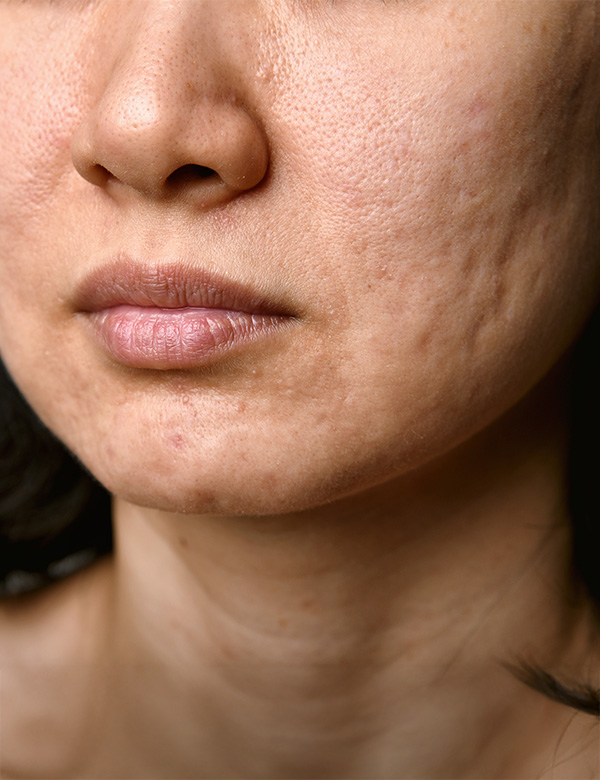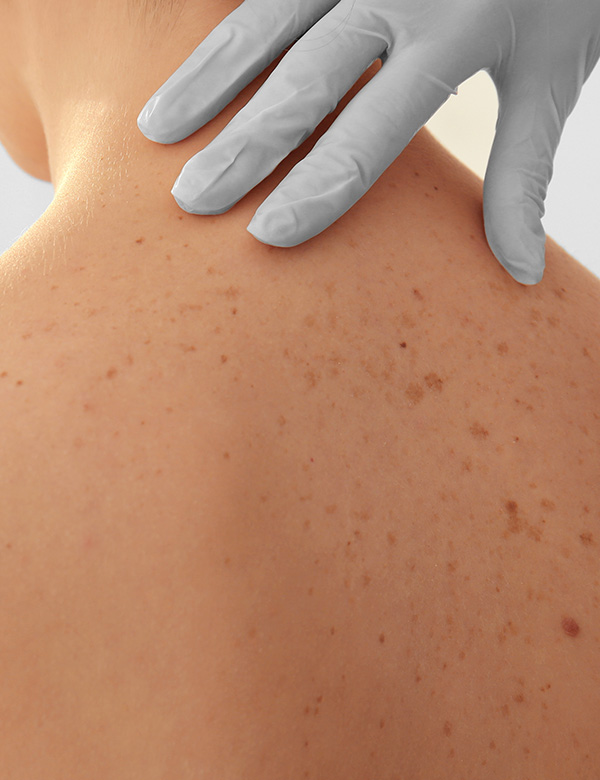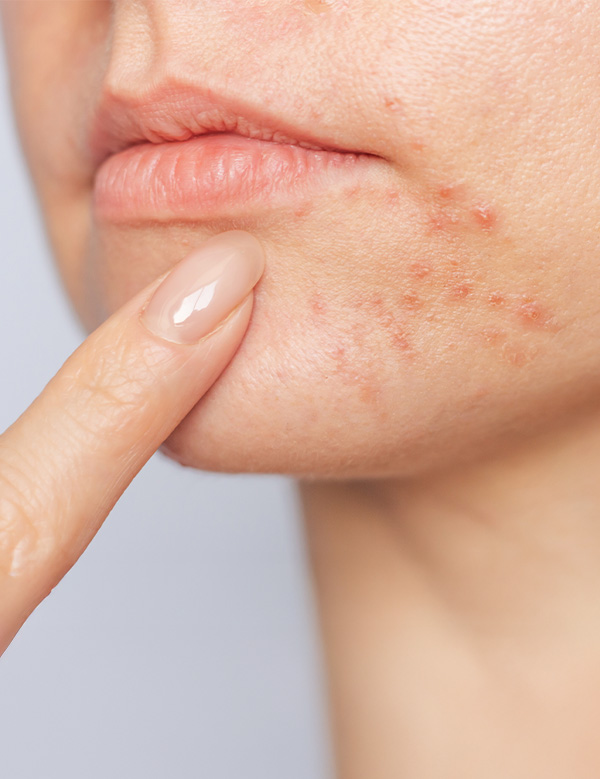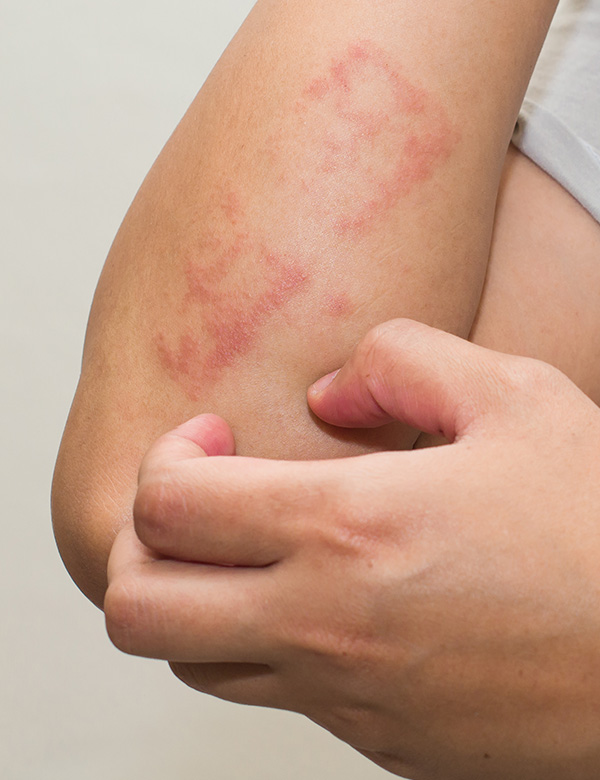Have scars treated or corrected
Dermatological and surgical scar treatment at Derma Medical Clinic in Zurich – Sihlcity
Scar Treatment
Chronische Abszesse und schmerzhafte Knoten durch erfahrenen Hautarzt abklären und behandeln in der Derma Medical Clinic in Zürich - Sihlcity
Whether acne scars, surgical scars or skin changes after injuries: At our clinic, we analyze which type of scar treatment makes sense – from laser therapy and injections to surgical correction by experienced dermatology specialists.
Examinations
Dermatological examination
Procedure
Initial consultation & treatment
Duration
Initial consultation: 20–30 minutes
Treatment: 15–60 minutes
How do scars form?
Scars form when the deeper layers of the skin are injured, for example through cuts, surgeries, burns or inflammation such as acne. The body repairs the tissue, but the new scar tissue is different in structure and appearance from healthy skin.
Some scars are barely visible, while others look unpleasant, feel tight, hurt or limit movement. Even small acne scars or visible surgical scars can affect daily life—both aesthetically and functionally.
Scar evaluation and treatment is a good idea if you …
- have visible scars—such as from acne, surgery, accidents or burns
- find a scar visually noticeable or bothersome
- have a scar that is painful, itchy, thickened or hardened
- notice that scars feel tight or limit your mobility, or had previous scar treatments but aren’t happy with the result

How do scars form?
Scars form when the deeper layers of the skin are injured, for example through cuts, surgeries, burns or inflammation such as acne. The body repairs the tissue, but the new scar tissue is different in structure and appearance from healthy skin.
Some scars are barely visible, while others look unpleasant, feel tight, hurt or limit movement. Even small acne scars or visible surgical scars can affect daily life—both aesthetically and functionally.
Who should consider scar evaluation and treatment?
Scar evaluation and treatment is a good idea if you …
- have visible scars—such as from acne, surgery, accidents or burns
- find a scar visually noticeable or bothersome
- have a scar that is painful, itchy, thickened or hardened
- notice that scars feel tight or limit your mobility, or had previous scar treatments but aren’t happy with the result
Treatment
In our consultation, we take time to carefully assess your scars.
Depending on the type of scar – flat, sunken, raised, or discolored – and any discomfort or scar age, different therapies may be suitable.
We also consider your skin type, any medical history, and previous treatments. Based on that, we’ll discuss which treatment makes sense – for appearance, function, or both.
What happens during scar treatment?
Treatment is planned individually and depends on the specific type of scar.
Laser treatment:
The laser removes the top layer of skin. This can make scars appear flatter, and noticeable discoloration such as redness or dark spots may fade gently.
Injections:
Cortisone can flatten thick, raised scars. Sunken scars can be filled to make the skin look more even.
Peels or cryotherapy:
For rough or hardened skin, a medical peel can gently remove the top layer. Some scars may also be frozen (cryotherapy) to smooth the tissue.
Surgical scar correction:
If a scar is especially noticeable or bothersome, it can be removed under local anesthesia and the skin resutured. The goal is for the new scar to heal in a less visible way.
How does a scar treatment work?
Initial consultation & skin analysis:
The dermatologist will examine your skin thoroughly, identify the type and severity of your scars, and advise you on suitable treatment options.
Therapy planning:
We create a customized treatment plan for your skin, scar type, and desired outcome.
Treatment:
Depending on the method, your treatment will be carried out by one of our doctors or a skin therapist (medical aesthetician). Laser, microneedling or peeling treatments are performed gently and in line with all safety standards.
Follow-up care & progress checks:
After each session, you will receive personalized skincare advice for home. Regular check-ups ensure the treatment is going as planned and can be adjusted if needed.

Whether acne scars or visible scars after surgery or injury: At Derma Medical Clinic, scar evaluation and treatment are performed by experienced dermatology specialists and our skin therapist (medical aesthetician).
All have many years of experience in the diagnosis and treatment of skin scars.

Dr. med. Benjamin Miller
Board-certified Specialist in Dermatology & Venereology FMH

Dr. med. Markus Dendorfer
Board-certified Specialist in Dermatology & Venereology FMH
What to expect from us
Treatment adapted to your scar
Sunken acne scars, raised surgical scars, or hardened scars after accidents – each scar requires a different treatment approach. We offer a wide range of therapies and carefully match the treatment to the scar’s appearance.
Outpatient procedures in our own operating room
When a scar needs to be surgically removed or re-stitched, we perform the procedure in-house, with local anesthesia and no hospital stay.
Skin therapy
Our skin therapist can be involved if needed—for example, to advise on skincare, support sensitive skin, or provide care after flare-ups.
All services under one roof
You receive diagnosis, medical treatment, and skin therapy all in one place. This gives you consistent care, short distances, and a coordinated process—from the first consultation to follow-up care.
You don’t have to just live with scars—whether from acne, surgery, or injury.
Book an appointment for a dermatological evaluation at Derma Medical Clinic in Zurich – Sihlcity.
FAQ – Common Questions about Foot Fungus
How do scars form?
Scars develop when deeper layers of the skin are injured—such as by cuts, surgeries, burns, or inflammation like acne. The body repairs the tissue, but new scar tissue looks and feels different than healthy skin.
What types of scars are there?
Scars can be flat, sunken (e.g. after acne), raised (hypertrophic), or oversized keloids that grow beyond the original wound. Discolored or hardened scars are also included. Treatment depends on the type, location, and extent of the scar.
When should you get a scar treated?
Treatment may be helpful if the scar hurts, itches, restricts movement, or is aesthetically bothersome. In general, the earlier a noticeable scar is examined, the better later discomfort can be prevented.
What scar treatment options are available?
Available options include laser therapy, microneedling, medical peels, cortisone injections, and—if needed—surgical correction. The dermatologist will decide the best method after a detailed analysis.
How does laser treatment for scars work?
The laser sends pulses into the skin that trigger the body’s healing process. New connective tissue can form, making the scar flatter, softer, and less visible. Multiple sessions are usually needed.
What does a skin therapist do, and how is that different from a beautician?
A skin therapist (medical aesthetician) specializes in treating skin conditions like acne, rosacea, or pigmentation. They work closely with dermatologists and use modern methods and medically approved products. At Derma Medical Clinic, every session is carried out by a qualified skin therapist and tailored to your skin type and condition.
Can scars disappear completely?
Complete removal is usually not possible. The goal is to improve the scar so it’s less noticeable or no longer bothers you. A realistic expectation is important.
What helps with acne scars?
Depending on the scar type, laser, microneedling, medical peels, or special skincare products can help. It’s important to start early and have a treatment plan—ideally after medical advice.
How should scars be cared for?
Gentle massage, moisturizing creams, and silicone gel or patches can help healing. Protecting the area from sun is also crucial, as new scars are very sensitive to light.
Is scar treatment painful?
Most procedures are well tolerated. We use numbing cream or perform the procedure with local anesthesia when needed—especially for surgical corrections. Cooling and aftercare help you recover quickly.



